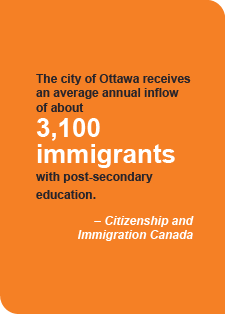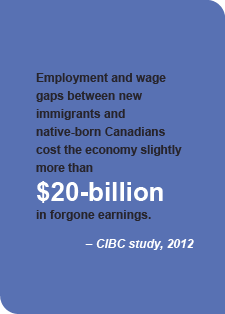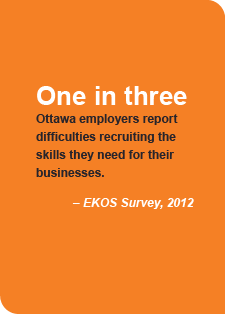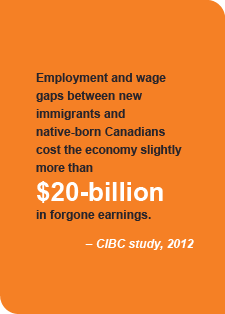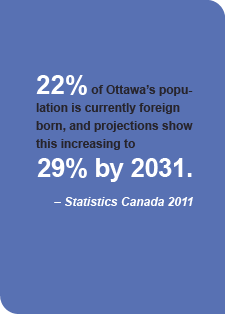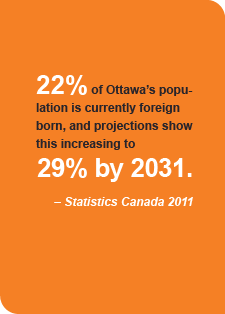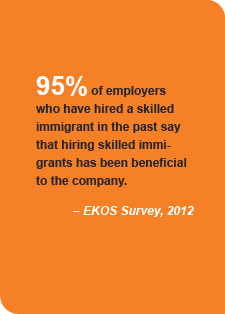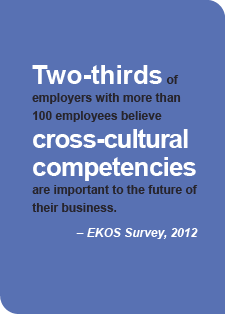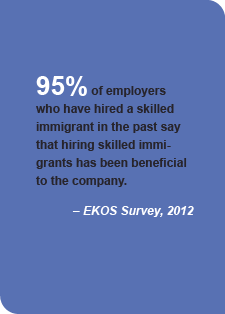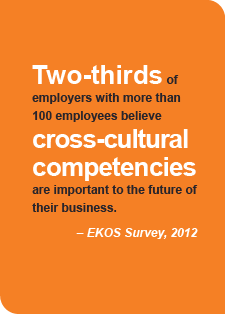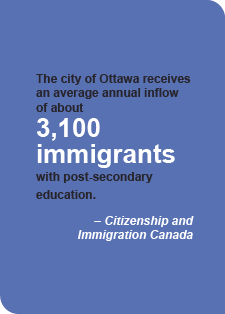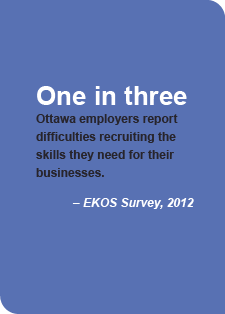The Link Between Cultural Diversity and the Bottom Line
Marcus Buckingham, one of the world’s leading management gurus, once said: “Differences of trait and talent are like blood types. They cut across the superficial variations of race, sex and age, and capture each person’s uniqueness.”
This uniqueness is what business owners and senior managers may be missing out on when they skip over the résumé of an internationally-trained immigrant who has all the qualifications to fill a job vacancy.
 There is ample evidence that a wide range of backgrounds and experiences, which constitute a diverse workforce, enhances innovation, creativity and productivity — all characteristics that can lead to an economic advantage for a business. In Diversity – The Competitive Edge: Implications for the ICT Labour Market, Wendy Cukier from Ryerson University’s The Diversity Institute indicates that American companies with diversity practices collectively generated 18 per cent greater productivity than the overall US economy.
There is ample evidence that a wide range of backgrounds and experiences, which constitute a diverse workforce, enhances innovation, creativity and productivity — all characteristics that can lead to an economic advantage for a business. In Diversity – The Competitive Edge: Implications for the ICT Labour Market, Wendy Cukier from Ryerson University’s The Diversity Institute indicates that American companies with diversity practices collectively generated 18 per cent greater productivity than the overall US economy.
Progressive business leaders are responding to that evidence. “We also believe diversity contributes directly to business success. Harnessing the skills and the cultural perspectives of newcomers to Canada generates innovative thinking and provides us with a competitive edge,” says Dennis Jackson, Scotiabank District Vice-President, Ottawa and West Quebec and a member of Hire Immigrants Ottawa’s Employer Council of Champions (ECC).
Key factors to the success of companies with inclusive recruitment and retention practices include: leaders who demonstrate commitment to diversity and managers who provide the training needed to increase awareness: enhance cross-cultural competencies: and help employees understand the link between cultural diversity and the bottom line.
Human Resources and Skills Development Canada (HRDSC) gets this. Recognizing the value of increasing diversity and providing a vehicle through which immigrants can receive quality work experience, senior managers championed the Immigrant Internship Pilot Program to recruit recently immigrated foreign-trained professionals. Now in its second year, the program is helping HRSDC to diversify its workplace and access the skills of newcomers thanks to supports such as the cross-cultural competency training that hiring managers receive and mentoring for each immigrant intern. HRSDC’s work on this project demonstrates that successful integration of immigrant employees into the workplace is a responsibility of the employer as well as the immigrant.
“This pilot has created an opportunity for HRSDC to recruit and mentor Foreign Trained Professionals, not only increasing the diversity of our workplace, but providing them with a quality work experience that will help them to better integrate into the workforce,” said Janice Charette, Deputy Minister of Human Resources and Skills Development Canada,
For its leadership, HRSDC received an Employer Excellence Award from Hire Immigrants Ottawa (HIO) in 2009.
With the impending retirement of thousands of baby boomers over the next 20 years, finding and developing talent is going to be a major challenge for workplaces. According to Compas, a well-recognized Toronto-based public opinion and research firm, 73 per cent of Canadian business executives have identified the recruitment of qualified candidates as one of their top sources of work stress.
The anticipated four-fold increase in the foreign-born population over the next 20 years will be part of the solution. Along with significant international work experience, more than 60 per cent of skilled immigrants have some type of post-secondary education; the proportion is even higher for working-age immigrants.
In many metropolitan areas, senior executives from several organizations are now working together in networks to strengthen their ability to attract and integrate skilled immigrants into their workplaces. Along with Hire Immigrants Ottawa, in Ontario these employer networks include the Toronto Region Immigrant Employment Council (TRIEC) and initiatives in Waterloo and Niagara. These networks are collaborating while recognizing that their communities are competing for talent. To quote Rosemarie Leclair, President and CEO of the Hydro Ottawa Group of Companies and Co-Chair of HIO’s Employer Council of Champions: “We need to do more to fully integrate our highly skilled and educated immigrants into our workplaces if we want to maintain our position as their destination of choice.”
Find out more on how to be a leader in diversity with tools and resources online>>
……………………………
The Link Between Cultural Diversity and the Bottom Line was pusblished in Human Resources Profesionals Association Ottawa’s magazine Up-Date, May 2010 issue .

